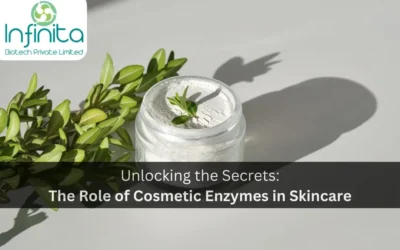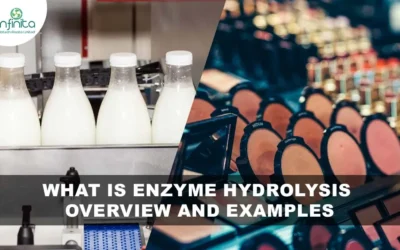Keratinase enzyme is a type of extracellular proteolytic inducible enzyme that can degrade keratin substrates that are insoluble. This enzyme can hydrolyze hair, feathers, and collagen in the sewage system during wastewater treatment. Additionally, it is useful in the food industry and the manufacturing of livestock feed, etc. Enzymatic hydrolysis of insoluble feather keratin using the keratinase enzyme from the poultry sector can be utilized to make adhesives, livestock feed, fertilizers, coatings, or uncommon amino acids such as serine, cysteine, and proline.
It is a protease enzyme that degrades keratin selectively. Keratinase enzyme is an adaptive enzyme that is only produced in response to the introduction of an inducer (keratin) in the microenvironment. Keratinase enzyme is extracted from a variety of microorganisms and has a wide range of applications in feed, leather, pharmaceutical, food, and many other industrial as well as major ecological applications.
Mechanism Of Action
Because the mechanism through which each bacteria destroys keratin is different, the end product differs as well. Certain fungi break disulfide bonds by secreting sulfites on the mycelium surface and reducing the acidic conditions, while Streptomyces produces intracellular reductase. Water-insoluble keratin, on the other hand, can only survive outside the cell in the form of granules. Since it necessitates insoluble keratin in frequent proximity with cells, disulfide bond reduction can only happen outside of the complete cell with significant metabolic capabilities, very possibly in the cell-bound redox system on the cell membrane.
The disulfide bond reduction is then carried out by a cell-linked redox pathway in white high-temperature actinomycetes. Keratinase enzyme possesses both disulfide reductase and polypeptide hydrolase action. The breakdown of keratinase is currently thought to be separated into three stages: denaturation, hydrolysis, and transamination. Firstly, the disulfide reductase reduces cystine (-S-S-) to cysteine (-SH), causing the high-level composition of keratin to dissolve, resulting in degenerative keratin protein. Polypeptide hydrolase progressively hydrolyzes the degenerative keratin protein into polypeptides, oligopeptides, and free amino acids. Finally, transamination produces ammonia and sulfide, which totally hydrolyzes keratin.
Industrial Production of Keratinase Enzyme
Fermentation is required to generate these enzymes on a big scale in an effort to match current industry demands. Fermentation factors like carbon source, nitrogen source, temperature, and others must all be optimised because they influence keratinase enzyme synthesis. Industry waste, like feathers, can be incorporated into the culture media. Different wastes, like wheat and soybeans, can also be employed as a substrate for keratinase enzyme production.
Keratinase enzymes must be purified before they may be used for enzymatic characterisation and other purposes. A variety of methods can be used to achieve a high-purity keratinase enzyme. Purification procedures include ammonium sulphate precipitation, gel filtration chromatography, and ion-exchange chromatography. To acquire a large quantity of enzymes, methods like the aqueous two-phase system can be used.
Current Application of Keratinase Enzyme
Keratin is considered good carbon, nitrogen, and sulfur that can be transformed into a variety of compounds in nature. Because of their propensity to break down keratins, keratinase enzymes have a wide range of industrial and biotechnological applications.
Livestock Feed Industry
Feather food has been used to enrich livestock feed for years, but there has been concern regarding the food’s nutritional content given the lack of utilizable protein in the food. Since they’re not digested by ruminants or other livestock, keratin proteins in feathers, as well as other keratinous substances, are mainly unreachable if the structural orientation given by distinct chemical groups is not dramatically fragmented.
Leather Industry
The use of a Keratinase enzyme to dehair is substantially enhancing as it has minimal elastinolytic action but zero collagenolytic action. Keratinases specifically break down the keratinous element of the follicle, allowing undamaged hairs to be removed without harming the leather’s quality. The use of keratinase in the leather industry has also decreased the possible danger to the environment caused by traditional procedures, but it has also created practices that can improve energy efficiency worldwide.
Detergent Industry
Detergents produced with bio-additives such as Keratinase enzymes are preferred over traditional synthetic-based detergents in modern times. They offer excellent cleaning features, like low-temperature washing tolerance, stubborn dirt removing properties, fabric fibre compatibility, and biodegradability. Numerous factors influence the overall effectiveness of Keratinse enzymes in detergent.
Fertilizer Industry
The prospect of bioconversion of the high-content keratin wastes into cost-effective and environmentally acceptable resources, such as a slow-releasing nitrogen source for natural and organic soil fertilizer. The organic fertilizer produced by keratinase-mediated waste mineralization can promote the growth of plants, enhance soil water retention capacity, and promote soil microbial activity, which also would promote phosphate solubility.
Pharmaceutical & Cosmetic Industry
Keratinase enzyme is also useful in the cosmetics and pharmaceutical industries. Dermatophytes produce keratinase enzymes, which is a key invasive component. As a result, a useful study direction in keratinase and dermatophyte infection is whether keratinase inhibitors or keratinase monoclonal antibodies can limit keratinase enzyme function, diminish the invasiveness of dermatophytes, and reach the objective of treating fungal diseases.
Keratinase Enzyme Applications In Other Industries
Keratinases have been shown to successfully degrade infectious prion proteins, which are fibrous and sheet-dominated proteins. PWD-1 keratinase efficiently destroys disease-causing prion protein, with 100% breakdown of the extremely infectious prion protein. The activity of keratinase on fibrous and resistant keratinous residue serves as a starting point for this mechanism. Keratinase might potentially be useful for the treatment of industrial effluents. The extraction of glucocorticoids from avian feather biomass was facilitated by keratinase from Bacillus sp. C4.
Infinita Biotech is an Indian company that manufactures, markets, and develops proprietary enzyme compositions for a wide range of industrial sectors. We produce eco-sustainable enzymatic solutions for different industries, including Detergent, Food & Beverages Sugar, Brewery, Wastewater Treatment, Food, Animal Feed, Agriculture, etc.

 Summarize this Article with AI
Summarize this Article with AI






